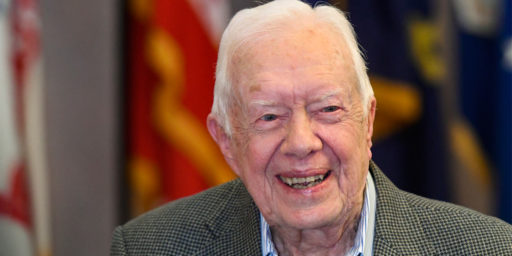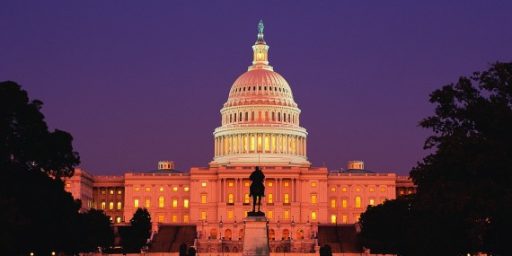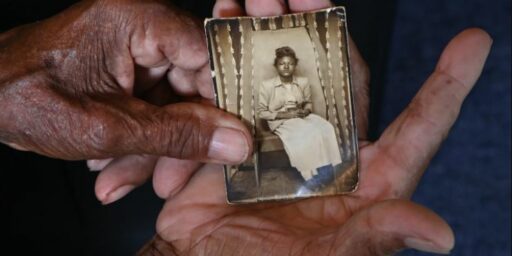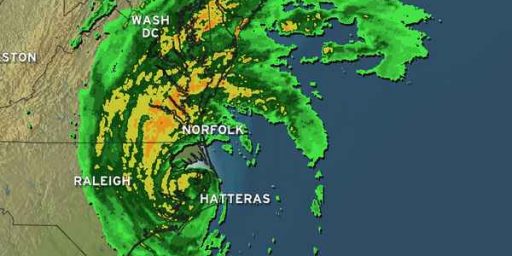Should Disaster Relief be Run by Military?
President Bush yesterday called on Congress to make the Defense Department, not FEMA, the lead agency in emergency response in the event of major natural disasters such as Hurricane Katrina.
Bush Urges Shift In Relief Responsibilities (WaPo, A12)
On Sunday, President Bush called on Congress to consider a larger role for U.S. armed forces in responding to natural disasters, as he completed what White House aides called a weekend “fact-finding” mission to determine whether the Pentagon needs more control. “Clearly, in the case of a terrorist attack, that would be the case, but is there a natural disaster — of a certain size — that would then enable the Defense Department to become the lead agency in coordinating and leading the response effort?” Bush said after a briefing from military leaders at Randolph Air Force Base here. “That’s going to be a very important consideration for Congress to think about.”
Bush has told aides that one of the major breakdowns in the Hurricane Katrina response was the federal government’s inability to seize control of rescue and relief efforts. Under existing law and procedure, a state governor is in charge when natural disasters strike and is responsible for deploying the National Guard, though in certain cases, the president can order troops to support local law enforcement.
Bush is asking Congress to consider a major change, potentially shifting federal responsibility for major natural disasters from the Department of Homeland Security to the nation’s top military generals. The Defense Department has been hesitant to take such a role because of sensitivity to the idea of adopting a police presence on U.S. soil and because of strains on the armed forces from the war in Iraq.
[…]
The current National Response Plan developed after the Sept. 11, 2001, terrorist attacks gives the defense secretary authority to provide military support for disaster relief efforts at the president’s direction. However, active-duty troops generally cannot take on domestic law enforcement roles, which is what many experts said was desperately needed to stop the rioting and violence in the streets of New Orleans after Katrina hit. National Guard troops under state control are allowed to take on law enforcement responsibilities.
Bush’s plan is getting hammered on both ends, with critics ranging from the Cato Institute to Jimmy Carter.
Let GIs Run Storm Relief? (AJC, p. 1) [Cox syndicate]
[…] Such a change could require revision of an 1878 federal act that bans the use of the military for law enforcement.
Military expert Gene Healy of the Cato Institute, in an analysis published Sunday, warned against tinkering with that law. “Having already wrecked a legendary American city, Hurricane Katrina may now be invoked to undermine a fundamental principle of American law,” Healy wrote, concluding that “when it comes to domestic policing, the military should be a last resort, not a first responder.”
In addition to shifting authority away from local officials, the change contemplated by Bush would take power away from the much-maligned Federal Emergency Management Agency. FEMA was established in 1979 by President Jimmy Carter after the National Governors Association asked for an entity to streamline state-federal links during emergencies. At the time, 16 major agencies were folded into FEMA. In March 2003, FEMA itself was folded into the Department of Homeland Security.
On “CNN Live Today” on Wednesday, Carter said the agency’s diminished role under Homeland Security led to its recent failures. “I made three promises. One was that the leaders of FEMA would always be highly qualified in handling a disaster. The second promise I made was that FEMA would always be an independent agency, and would not be part of another larger agency. And the third promise I made was that FEMA would always be adequately financed. Well, as you know, all three of those promises have been violated.”
Healy’s argument about the implications of politicizing the armed forces by inserting them into domestic law enforcement functions is well taken. Moreover, the military trains for a warfighting mission. As much as overseas “nation building” missions undermines that primary focus, it is sometimes a necessary adjunct to achieving the political objectives for which wars are fought. Having the military focus on domestic relief operations, though, would be much more burdensome because mission creep would be unstoppable once the genie was out of the bottle.
He expands in an article at Cato’s website entitled, “Domestic Militarization: A Disaster in the Making.” A brief excerpt:
The Posse Comitatus Act is no barrier to federal troops providing logistical support during natural disasters. Nor does it prohibit the president from using the army to restore order in extraordinary circumstances–even over the objection of a state governor. What it does is set a high bar for the use of federal troops in a policing role. That reflects America’s traditional distrust of using standing armies to enforce order at home, a distrust that’s well-justified.
There are very good reasons to resist any push toward domestic militarization. As one federal court has explained, “military personnel must be trained to operate under circumstances where the protection of constitutional freedoms cannot receive the consideration needed in order to assure their preservation. The Posse Comitatus statute is intended to meet that danger.” Army Lt. Gen. Russell Honore, commander of the federal troops helping out in New Orleans, seemed to recognize that danger when he ordered his soldiers to keep their guns pointed down: “This isn’t Iraq,” he growled.
Soldiers are trained to be warriors, not peace officers–which is as it should be. But putting full-time warriors into a civilian policing situation can result in serious collateral damage to American life and liberty.
Furthermore, as painful as it is to agree with Carter on much of anything, he’s right. FEMA needs to be treated much the same as NASA, the FDA, and the Federal Reserve Board are. We’d never think of putting amateurs with little substantive expertise in those positions; given the high cost of failure at FEMA, we can’t do it there, either. During natural disasters, FEMA should be the lead agency; it should only be subordinate to Homeland Security during terrorist attacks and the like.
FEMA is and should remain a coordinating body. The military, especially the National Guard, will of course have to be utilized because it alone has the massive manpower and lift resources to get parts of the relief mission done quickly. But its role should always be ancilliary for domestic matters unless there is an enemy attack.






Very little of a modern disaster relief effort is based around policing. The military should be able to contribute a lot to disaster relief without having to get anywhere near the bounds of Posse Comitatus.
Most of our actual military (the one we deploy around the world, not the one in the movies) is oriented towards logistics, and it’s a fairly simple shift to have them do the second-tier response in things like road clearance and supply delivery.
Law enforcement? For every National Guard soldier carrying a weapon to enforce order, there’s a dozen carrying sandbags or shovels or supplies.
Rescue? That’s not really a law enforcemtn duty, either.
The Cato worries about discarding Posse Comitatus shows a severe misunderstanding of what our guys actually do in disaster areas.
Something else that nobody seems to know about: A reshuffling of FEMA’s role in disaster relief and planning has been in the works for years, and was officially kicked off back in July. There’s a whole new Homeland Security Directorate that’s going to be tasked with planning and mitigation.
See “The Directorate” at my blog (linked below) for more about this.
Right now, that is a difficult question to answer, We all witnessed how the Governors of Mississippi and Alabama handled the Katrina disaster and we all witnessed how Texas and the Governor of Texas handled the Katrina refuge situation and Rita. We also witnessed how the Governor of Louisiana and the Mayor of New Orleans handled Katrina.
I would agree with a Federal takeover if the Feds encountered someone like the Governor and Mayor in Louisiana, but would have difficulty with States like Miss. Alabama, and Texas.
Why not do what Clinton did? Like, have a FEMA that was competent and not run by political hacks and cronies. Just a thought…
Just a note – in an earlier thread you may remember that I talked about San Francisco’s post-quate analysis, and their recommendation that major disaster plans should use volunteers. I was surprised, and encouraged, to see the newcasters of Fox relaying the message that people who had flat-bottom boats should bring them down and use them.
As far as Military or not … whatever works, but I have a feeling that a genuine disaster agency staffed by disaster specialists is the answer – and ready to coordinate with volunteers.
When you have X thousand people in trouble I think you need a bit of a “swarm” behavior to find and help them.
Did you see that Wal-Mart had a Disaster Recovery specialist with degrees in the field, and that was why they were so fast off the mark?
Yeah, Clintons FEMA
“Federal Emergency Monica Alert” Hillarys coming
Putting the Military in charge of a natural disaster just because President Bush can’t find the remote to the TV, is a bit overkill isn’t it?
I think that some of you are missing the point. I don’t care who is in the White House, I don’t want them having this kind of authority for military operations within the US. There’s no need for it and once you allow it and their role is widened, it is that much easier for it to be widened further.
It’s not the military’s role. They have a purpose and it isn’t policing its citizens. There are agencies for that already. They have plenty of room for disaster relief now. Changing the rules would only make things more difficult. Since when does putting someone who doesn’t know squat about something in charge of something make sense?